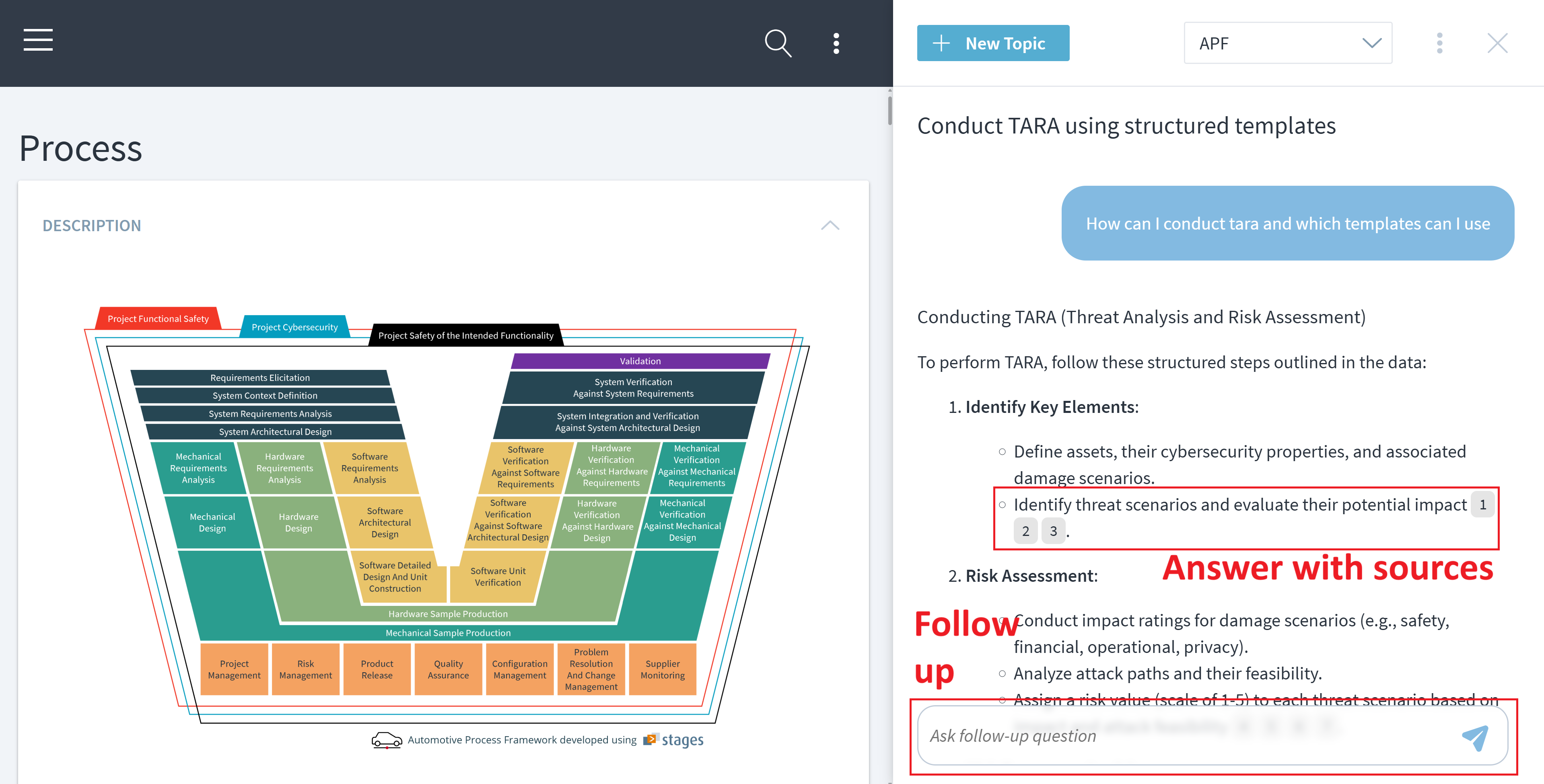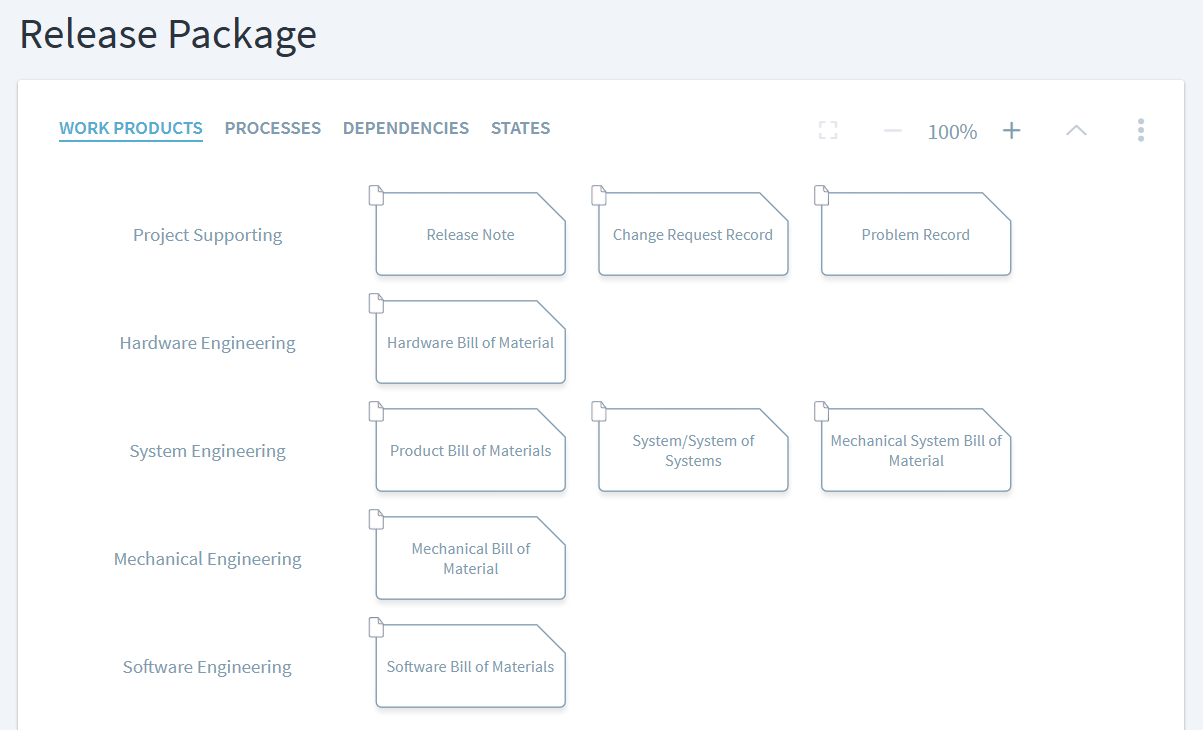Table of Contents
Release Notes for Stages 7.12
AI is transforming process management and the new Stages release 7.12 brings powerful new features that are enabled by latest AI technologies.
Based on a process knowledge graph, which is directly derived from the modeled processes, Stages now contains as chat assistant that answers users' process questions without the need to search or navigate. A new data exchange mechanism allows the creation of APIs to bring process data to external tools or any other system that requires processes. New tool integrations and new reference models improve process execution and compliance management.
Please note, that Stages 7.12 is not a Long Term Support (LTS) release. Stages 7.11 will continue to be the LTS version.
Introduction Webinars
To get a live introduction into the new features of Stages 7.12, click on the link to register for the intro webinar that fits best for your language and timezone.
| Language | Region | Date and Time | Registration |
|---|---|---|---|
| English | Americas | Wednesday, Sept 24, 2025, 01:00 PM - 02:00 PM EDT | Register here |
| German | Europe | Mittwoch, 24. Sept 2025, 13:00 - 14:00 CEST | Register here |
| Chinese | Asia | Thursday, Oct 16, 2025, 03:00 PM – 04:00 PM CST | Register here |
| Japanese | Asia | Tuesday, Oct 21, 2025, 16:00 – 17:00 JST | Register here |
| Korean | Asia | Tuesday, Oct 14, 2025, 04:00 PM - 05:00 PM KST | Register here |
AI Chat Assistant
The highlight of the new release is the purpose-built AI chat assistant. Instead of navigating or searching for process content, users can simply ask questions.
The chat system is trained on the actual process models in Stages and utilizes a process knowledge graph technique that provides context, resulting in fewer hallucinations and greater attention to detail compared to other AI approaches.
The chat assistant can tailor its responses to align with relevant process variants – for example whether or not a target product is safety relevant – or processes that are tailored to specific programs, projects, or teams.
Users can gain further trust in the accuracy of the given answers by viewing evidence notes and links to the original sources of the defined processes. This makes finding templates, checklists, and other downloadable content very easy by simply asking for it.
See here for more info on how to use the chat assistant and see here how to configure it.
Please note that the metamodel needs to be enhanced for the chat assistant to work.
On-premise and managed services customers are required to provide their one AI subscription. Details on the subscriptions required can be found here. Managed services customers can contact UL for an offer to use a shared AI subscription. For technical requirements & technical configuration please find details here.
Supported AI Service Providers
Similar to the existing AI-support for process modelling, the AI chatbot is implemented via Azure AI. Other AI service suppliers and local LLMs will be supported in future releases. Please contact us if you require working with different AI service providers.
For maximum AI data privacy, the Stages Managed Service can be configured to use your existing Azure AI subscriptions. If you do not have access to a dedicated Azure AI subscription, we are able to provide one.
AI Features On-Premise
The restriction that limited AI-enabled features only to be available on Stages Managed Service has been removed. All AI features are now also available in on-premise installations.
Please contact the customer care team for instructions how to set them up.
Data exchange via REST APIs
Stages 7.12 also allows to utilize aggregated process data in other tools. REST APIs can be customized for various use cases, providing the exact process model information required for a specific scenario. For seamless exchange, the JSON data format is being used.
This efficiently enables linking the Stages process models to other engineering data, for example through business intelligence platforms, and brings processes even closer to the relevant execution tools.
Please see here for more information and examples. If you need support in creating APIs, the respective scripts, or in any other data access topic, please contact your Stages consultant.
New and Updated Integrations
With the new Stages version, process feedback from users can now also be collected in Sharepoint 365 lists.
The process execution for IBM’s Engineering Lifecycle Management (ELM) system has been upgraded to include ELM v7.1.
Similar to existing integrations with ALM and the configuration management system, work products in Atlassian Confluence can now also be accessed, managed, and baselined.
Other Enhancements
A new “Copy Associations” operation has been introduced so process modelers can efficiently merge two process elements. This streamlines the elimination of duplicate process elements, e.g. when two roles need to be consolidated into one.
Work product files that are stored in SharePoint Online can now be directly opened in the browser, which removes the need to download, locally modify, and upload such documents.
Unified Configuration Metamodel Changes*
Assemblies were introduced in a previous version of Unified Configuration to simplify the handing of work product groupings. A newly added assembly visualization shows the work products contained in an assembly, which improves transparency and navigation.
Workflows can now have accountable roles instead of responsible ones. This improves the transparency of roles being responsible for activities to be executed and roles being accountable that each activity in a workflow will be executed. Also, this improves the roles visualization because the difference between workflow accountability and activity responsibility is easier to see.
For backwards compatibility, responsible roles for workflows are still supported, but using both for a workflow is discouraged.
Various updates have been made to improve the consistency of element visualizations.
For compatibility with Agile SPICE, the Automotive SPICE metamodel now has additional “Information” and “Interpretation” subtypes. A new “Chapter” subtype improves structuring of future Automotive SPICE reference models similar to the original standard documents.
To improve consistency and reduce complexity, a new unified metamodel for reference models has been added, which will be used by future reference model versions.
If you are using a customized version of the Unified Configuration, please contact your Stages consultant to plan an upgrade.
New reference models available
In addition to new product features, we also made new reference models available to manage compliance.
Please reach out, if you are interested to use one or more of the following standards in Stages.
General
- ISO/IEC/IEEE 15288:2023 Systems and software engineering — System life cycle processes
Automotive
- Agile SPICE 1.4.1
- ISO/PAS 8800:2024 Road vehicles – Safety and artificial intelligence
- UN Regulation No. 155 Uniform provisions concerning the approval of vehicles with regards to cyber security and cyber security management system
- UN Regulation No. 156 Uniform provisions concerning the approval of vehicles with regards to software update and software updates management system
- UL 4600 Edition 3 Standard for Evaluation of Autonomous Products
Aerospace & Defense
- ARP4754B:2023 Guidelines for Development of Civil Aircraft and Systems
- DO-178C:2011 Software Considerations in Airborne Systems and Equipment Certification
- DO-254:2000 Design Assurance Guidance for Airborne Electronic Hardware
- ARP4761A:2023 Guidelines for Conducting the Safety Assessment Process on Civil Aircraft, Systems, and Equipment
- DO-326B:2024 Airworthiness Security Process Specification
- AS9100D Quality Management Systems - Requirements for Aviation, Space, and Defense Organizations
Industrial
- UL 1998 Edition 3 Software in Programmable Components
- UL 2900 Edition 1 Software Cybersecurity for Network-Connectable Products, Part 1: General Requirements
- IEC 61511-1 Edition 2.1 Functional safety – Safety instrumented systems for the process industry sector
- IEC 62061:2021 Safety of machinery — Functional safety of safety-related control systems
- IEC 62443 Cybersecurity for Industrial Automation Systems
See here for the full list of available reference models.
Please let us know if you have additional compliance requirements. Our teams are ready to implement them for you.
How to Upgrade to Version 7.12
Please contact our customer care team to request the installer downloads if you run Stages on-premise or request an upgrade of your Stages Managed Service instance. In case of on-premise, please follow the upgrade instructions from V7.11 to V7.12.
Notes
For topics marked with *: please contact your product consultant for more info on how to integrate those enhancements into your configuration.

